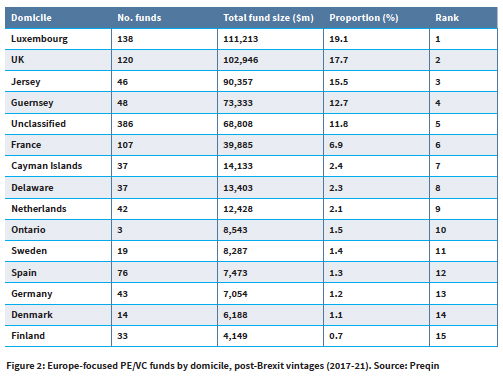 Despite a challenging 18 months for the global economy, the Channel Islands’ funds sector is performing better than ever
Despite a challenging 18 months for the global economy, the Channel Islands’ funds sector is performing better than ever
Put yourself in the shoes of a fund manager deciding where to domicile a new fund. The choices you make today could certainly have major implications for the fund’s long-term performance. How will your destination’s political environment, tax regime, regulations or geographic location affect its success?
For many investors, the Channel Islands continue to be an attractive option, especially for those based in the UK and Europe. But how will factors such as the pandemic, shifting regulations and Brexit play into decision-making?
A good year for funds
It has been a rocky 18 months for the global economy. However, looking at the funds industry’s performance in isolation, you’d be forgiven for failing to register altogether that there had been a global pandemic, fallout from Brexit or an international recession.
Figures from Hedge Fund Research, for example, show that 2021 has so far seen the strongest first-half performance in a calendar year since 1999. Total hedge fund capital surpassed an estimated $3.96trn at quarter-end, an increase of $360bn from the start of the year.
More broadly, since the beginning of 2021, all kinds of funds have continued to perform remarkably well in most domiciles. According to data from Morningstar, US funds returned an average 7.9% in the first seven months of the year, while European, Asian and African funds returned 6.8%.
And zooming in on the Channel Islands, funds have performed even better than in other key regions, returning 10.2% on average, according to Morningstar.
What’s more, after the UK, Guernsey and Jersey remain the second and third largest domiciles for private equity and venture capital funds in Europe (setting aside unclassified funds), according to analyst Preqin (see figure 1).

Elliot Refson, Head of Funds at Jersey Finance, agrees the bailiwick has continued to perform well. “The value of regulated funds business serviced in the jurisdiction reached a new record high of £410bn. This reflects 13.6% year-on-year growth and 79.5% over the past five years.”
There has been similar growth in Guernsey. A June report from the Guernsey Financial Services Commission notes that the net asset value of Guernsey funds increased by £30.4bn over the previous 12 months (13%).
Channel Islands funds have managed not only to survive but to thrive in what has been an otherwise challenging year.
In many ways, their success has been about sticking to the basics and the things the islands do best.
Mark Symons, Senior Manager at Apex Fund Services in Guernsey, notes: “Funds are reassured by domiciles with a mature funds industry, a choice of highly experienced administrators, a sophisticated legal system with top-tier legal firms, Big Four and other leading audit firms on hand.” Both Guernsey and Jersey tick all these boxes.
Refson adds: “We offer regulatory stability in addition to political stability and fiscal stability, as well as a minimal change outlook from a regulatory, legal or economic perspective.”
 Meanwhile, Antoinette Kyriacou, Head of Private Equity at Apex Group’s Jersey office, notes: “In uncertain times, managers and investors are seeking security and stability in their fund domicile.
Meanwhile, Antoinette Kyriacou, Head of Private Equity at Apex Group’s Jersey office, notes: “In uncertain times, managers and investors are seeking security and stability in their fund domicile.
“They are continuing to gravitate towards jurisdictions with a good reputation and track record, as well as a supportive regulator that is robust but flexible and encouraging of innovation.”
The islands have also seen continued success with specific kinds of products. In Jersey, for instance, Refson says the main driver of growth in the alternatives space is the private equity and venture capital sector – “something we have been seeing for some time now”.
By playing to their strengths, the islands have managed to weather the storm of the pandemic.
Similarly, Alex Smyth, Director at fund administration firm Oakbridge, explains: “Jersey has forged a formidable reputation in private equity and real estate in particular.
“This puts Jersey in a great place for the future, especially considering that it is anticipated that private markets assets under management (AUM) will increase by $4.9trn, reaching $14.4trn by 2025 – around 10% of overall AUM worldwide.”
In uncertain times, destinations such as Jersey and Guernsey offer fund managers greater confidence when choosing where to domicile. But the islands are not sitting on their laurels.
When the pandemic struck, businesses and the authorities in the Channel Islands were quick to address potential customers’ concerns.
Ian Smith, Client Director at the Guernsey office of fund administrator Ocorian, says: “Guernsey was well marketed during the pandemic.” The authorities made it clear that “despite border restrictions being in place, the island was operating as usual”, he adds.
By taking active steps to promote the islands’ funds industry, customers could be confident that the pandemic would not affect operations.
That said, there is a general feeling that the pandemic itself hasn’t, so far, had a significant impact on fund domiciliation.
“Our experiences over the past year have shown that Covid-19 has not affected fund domiciliation patterns,” Kyriacou notes. “But should travel restrictions continue beyond this year, we may see it beginning to affect domiciliation, with geographical proximity becoming more important.”

Brexit impact
Then there’s the issue of Brexit. Data from Preqin (see figure 2) shows that since the vote to leave the EU, the UK has lost out to Luxembourg when it comes to the creation of new PE/VC funds.
Cameron Joyce, VP of Research Insights at Preqin, explains: “While UK-domiciled funds have been the most popular based on their aggregate size, the top spot has been taken by Luxembourg for vintages after the Brexit vote in 2016.”
However, this political shift hasn’t significantly affected the Channel Islands, which have continued to perform well despite the Brexit fall-out. As Refson explains: “Our position post-Brexit is the same as our position pre-Brexit.”
Since the Channels Islands are independent of the UK and hold third-party status with the EU, the islands have not been significantly affected by the political turmoil.
Speaking from a Guernsey perspective, Smith sums up the island as “decidedly politically stable”, which is a key benefit.
The islands’ authorities are also proactive when it comes to regulation, and have continually worked to stay in line with new rules that could have an impact on fund domiciliation.
For instance, Smith says: “Guernsey is forward-thinking in its approach to global regulatory issues and is often ahead of the regulatory curve thanks to the proactive relationship between its regulators and financial community.”
The close relationship between funds and the regulatory authorities on the islands means they can continually adapt to any external pressures.
So, funds domiciled on the Channel Islands are well placed to manage BEPS requirements and ever-growing substance demands, for instance.
New avenues
The Channel Islands’ continued success can also be put down to a proactive strategy to drum up new business.
While Jersey’s largest market remains the UK, Jersey Finance is attempting to diversify its funds footprint by geography and asset class.
“Following the opening of our New York office in 2019, the US has become our fastest growing market, with AUM rising by 17.2% and the number of new funds rising by 37%,” explains Refson.
The Channel Islands were also early movers on ESG (environmental, social and corporate governance) funds, with Deutsche Bank expecting ESG assets to surpass $100trn by 2028.
In March, Jersey Finance launched a sustainable finance strategy, which shows how funds and the wider financial services industry can support the transition to a more sustainable future.
Fund managers and investors are increasingly keen on these sorts of funds and, says Kyriacou, Jersey is well positioned to take advantage of this emergent trend.
A recent survey by IFI Global revealed that 69% of investors and fund managers believe ESG considerations will influence fund domiciliation, particularly in Europe.
With the Channel Islands preparing themselves for the growth of these markets, they could become a destination of choice for ESG funds.
There are also a number of attractive innovations, such as Jersey’s Private Fund regime, established in 2017. The structure offers attractive speed to market, with a 48-hour regulatory approval timeframe, and is a cost-efficient option compared with EU-style AIFM structures.
In 2020 alone, a total of 100 funds were launched under this structure, according to Jersey Finance.
For a fund manager deciding where to domicile a new fund, the Channel Islands make a strong case. With their established strengths, adaptability and proactive approach to emerging trends, they offer an attractive package – which goes a long way to explaining their continued success.